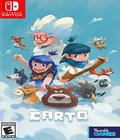Buy Carto
Up until recently, "charming" wasn't a word that would be used to describe a game. Yet here we are, with a slew of titles over the past few years with wholesome presentations that you can't help but adore at first sight. Joining this group is Carto, which had a game trailer that gave people warm, fuzzy feelings. Luckily for them, the game lives up to that first impression with some solid gameplay to back it up.
You play the role of Carto, a little girl living on an airship with her cartographer grandmother. She discovers that her granny has a special map that changes the world depending on where each square is placed. One night, Carto wanders off to her granny's workbench and places squares for a thundercloud and their airship together, summoning a vicious storm that hits the airship and sends her tumbling overboard with the map. Carto wakes up relatively unharmed but with only part of the map. With a note from her granny saying that everything will be fine, Carto sets off to locate the remaining pieces of the map and find her way home while also helping out everyone she meets.
There are a few things that make the story stand out in a positive way. For starters, the writing is sharp, and while some of the jokes can seem corny, every character is interesting, including Carto, who rarely speaks more than emoticons, so she's an adorable but mostly silent protagonist. It's fairly lighthearted fare, but the writing celebrates each of the cultures throughout your 6-8 hour journey. Every place emphasizes the good in everyone, and it helps that the game has no conflict of any sort. There are no enemies to fight, and there isn't a big revelation that stems from or leads to tragedy. The game also does a great job of tying up all of the loose ends so every place gets a happy resolution without feeling cheesy. This feels like a family movie or TV series that you wouldn't mind watching if the game were to venture into those media.
Without any combat, Carto deals mainly in puzzles, and almost all of them use your map to some capacity. Your map only has a few restrictions, which will be familiar if you've played the board game Carcassonne. While map pieces can exist on their own, they need to have matching borders on the sides that you want to link together. For example, the edge of a square that contains a forest can only match up with another map piece's side that also contains a forest. The pieces can be rotated to create those links, and you're free to rearrange the map pieces even if you've already placed them on the board.
The mechanics seem simple enough, and some of the early puzzles do a great job in training you to use these mechanics in several different ways. For example, escorting a character from some side of an island to another requires you to take the piece he's on and move it to the opposite side. Later on, you'll be asked to create large sections of a certain land type or create a new space by surrounding a blank spot with tile sides of the same type, so you need to take existing pieces to create something new. More often, the reward for solving puzzles is more map pieces, and the new pieces often lead you to new characters or puzzles that feel more traditional, since they require you to manipulate items instead of messing with the map. It makes for a good gameplay loop, and the overall runtime strikes the perfect balance, so the experience doesn't feel too short or overstay its welcome.
Even though the inhabitants don't seem to mind that their place is shifting due to your actions, there's only one real issue with some of the puzzles. For the most part, the game makes them tricky yet solvable, but there are a few that are almost too obtuse, requiring lots of trial and error or dumb luck. They don't feel satisfying when you solve them, but you notice them because they're so rare; most of the puzzles leave you feeling smart when you figure out their solution.
Rounding out the package is a presentation that always brings a smile to one's face. The soundtrack is filled with relaxing melodies that put the player in an exploratory mood. Even during the spookier moments, such as trying to navigate through a fog-filled forest, Carto maintains a calm vibe that is in line with the game's lack of conflict. Graphically, the title pulls off the hand-painted look with storybook-style illustrations filled with storybook-like colors and characters that feel friendly. As alluded to earlier, it looks adorable and complements the writing.
Carto is a feel-good kind of game. Most of the puzzles feel clever, and the brisk pace means that the concept never lingers for too long. The story is very good with a cast of friendly characters and nary a conflict. It's the kind of game that you want to play at least once and feel good about once you reach the end credits.
Score: 8.5/10
More articles about Carto












 Carto is an adventure game wrapped around a world-shifting puzzle mechanic. Use this power to explore mysterious lands, help a quirky cast of new friends, and guide Carto on her journey home.
Carto is an adventure game wrapped around a world-shifting puzzle mechanic. Use this power to explore mysterious lands, help a quirky cast of new friends, and guide Carto on her journey home.









